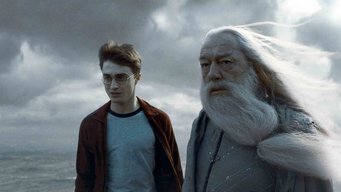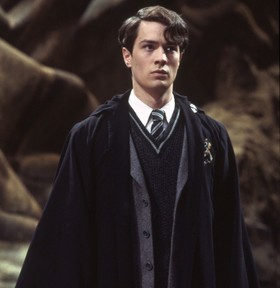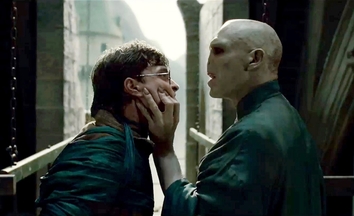Written by Kate McHargue Recently my roommate, a slight Harry Potter fan, asked me to go see Fantastic Beasts and Where to Find Them with her. She knew that I, a diehard Potterhead, couldn’t refuse. And in the middle of my second viewing of this film, I had a full blown HP fan existential crisis. In the scene where Graves (Grindelwald) comes to Credence and asks about the Obscurus on the loose, he heals Credence’s abuse wounds but manipulates him with promises of freedom and acceptance. And my first thought was, “Geez, Grindelwald really is evil. Leaving that poor child in an abusive environment simply to serve his own purposes and ‘the greater good,’…. ugh, pure evil.” And then I realized, isn’t that exactly what Dumbledore did? Rowling made it clear that Harry was under the protection of his mother’s love and sacrifice while he resided with her only living relative, Aunt Petunia. Yet even with this justification, the fact remains that Harry Potter was left in an abusive household so that he could survive to the age in which he would be used as a pawn in the chess game of Voldemort’s demise. The movies may downplay the Dursley’s abusive nature, making it seem as though they are mean or overbearing but ultimately not the worst guardians ever. The books, however, elaborate on the food deprivation, the physical abuse, the alienation, and the psychological attacks Harry endures at the hands of his only living family. And Dumbledore knows this, McGonagall warns him of the Dursley’s cruelty in the first chapter of the first ever book. But he chooses to leave Harry there anyway. Plenty of fans have criticized Dumbledore’s character for his moral gray areas and I’d be lying if I said I hadn’t had my own moments of doubting his goodness as a character. But the parallels with Grindelwald, only hinted at in the HP series and now on full display with Fantastic Beasts, makes it clear that the only thing separating Grindelwald and Dumbledore is that Dumbledore ultimately accomplished the “good” he set out to do. But at what cost? With the inclusion of Fantastic Beasts in the Wizarding World narrative, it becomes clear that child abuse is one of the biggest themes at work in this story. Let’s look at the pattern. 
 Apparently, Harry Potter is the only child in this series who not only survives the effects of abuse but who goes on to do immense good, foster healthy relationships, and come to some sort of peace with some of his abusers (“I don’t think you’re a waste of space. You saved my life.” – Dudley Dursley). The rest are left to deal with their pain and hatred by themselves, often in unhealthy ways that are a danger to themselves and those around them. Harry was given the opportunity to control and hone his powers. He formed friendships with Ron, Hermione, Hagrid, etc. and found loving family figures in the Weasleys and Sirius Black and Remus Lupin. But let’s imagine a Harry Potter who befriended Draco Malfoy instead of Ron Weasley in that compartment on the Hogwarts Express. A Harry Potter who wasn’t heralded as a famous wizard but was instead mocked or ridiculed with no friends to support him through those dark times. A Harry Potter who never discovered there were those who would love and protect him and spent his life feeling unwanted and despised. Would that Harry perhaps have seen the allure of the power that hate and vengeance can fuel? The implications of this pattern are that monsters are not born, they are created. And while no one would argue that Grindelwald, Voldemort, etc. are not responsible for their cruel actions, one has to question the people who contributed to their dangerous ideologies and their rise to power. Dumbledore himself confesses to disregarding the warning signs of Tom Riddle, as do many others (*cough* Professor Slughorn *cough*). But while so many in this wizarding world wondered after the fact if they could have done more, so many were willing to turn a blind eye to the blatant child abuse and resulting dangerous behaviors they witnessed before that terrible turning point. I’d like to be clear that I’m not stating that survivors of child abuse grow up to be rage filled psychopaths. But I am calling out those who witness child abuse (physical, mental, emotional, etc.) and do nothing. These people are just as responsible as the abusers for the negative effects that follow. While many survivors of child abuse become a Harry Potter, some are unfortunately going to struggle and become a Tom Riddle. Or worse, they become a Credence Barebone and never get the chance to grow up and, hopefully, heal. Grindelwald had his “greater good” and Dumbledore had his master plan to defeat Voldemort, but at the end of the day whatever “good” either of these men might have managed to do is forever tainted and marred by the fact that a child had to suffer to accomplish it. And perhaps the old saying is true, that you can’t make an omelet without breaking a few eggs. But children aren’t eggs, they shouldn’t be broken, and absolutely nothing justifies child abuse.
2 Comments
|
Archives
December 2024
|
|
© 2012-2025, Nerds That Geek LLC.
All Rights Reserved. |
uWeb Hosting by FatCow

